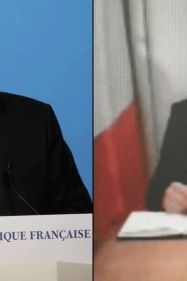Artificial Intelligence (AI) is revolutionizing many aspects of society, from healthcare to communication. However, its darker applications are becoming increasingly apparent.
In 2023, Slovakia became a cautionary tale when a fake audio recording targeting a prominent candidate in its national election sparked widespread outrage and concerns about electoral fraud.
This article examines the mechanics of the attack, its fallout, and the broader implications of AI’s role in undermining democracy.
The Attack: A Deepfake Designed to Deceive
Deepfake technology uses AI algorithms to create highly convincing but entirely fabricated audio or visual content.
In the case of the Slovakia election, a deepfake audio recording was produced and circulated, purportedly capturing a conversation in which a leading candidate made controversial and incriminating statements.
Step 1: Crafting the Audio
The attackers likely trained an AI model on recordings of the candidate’s public speeches and interviews to replicate their voice with uncanny accuracy.
It is actually fairly easy to do: modern platforms like ElevenLabs or Cartesia allows their customer to clone a voice with as little as 15 seconds of clean audio.
The fabricated content was then designed to sound natural and spontaneous, making it difficult to identify as fake without technical expertise.
In it, the candidate was heard boasting about how he rigged the election.
Step 2: Strategic Timing & Dissemination
The audio was released on social media platforms and messaging apps—channels with high virality potential.
Anonymous accounts and bots amplified its reach, ensuring that it spread quickly and broadly before it could be verified or debunked.
The timing of the release, close to the election date, was strategic. Two days before election day, Slovakia enters a silence period which prohibits media discussions of election-related developments. This left little room for damage control and publicly debunking the deep fake.
The Fallout: Political, Social, and Technological Consequences
The deepfake had immediate and far-reaching consequences, not just for the targeted candidate but also for Slovakia’s political landscape and public trust in its democratic processes.
Political Consequences
The candidate targeted by the deepfake faced a significant backlash, with their opponents using the fabricated recording to question their integrity and suitability for office.
Although forensic experts later determined the audio was fake, the damage to the candidate’s reputation was substantial and arguably irreversible.
The election results were potentially influenced by this calculated disinformation campaign.
Social Ramifications
The incident sowed discord among the electorate, dividing voters along lines of belief and skepticism.
For many, the fake recording reinforced existing biases, while others expressed doubt about the legitimacy of all political communications.
The deepfake heightened tensions and deepened polarization in an already fraught election.
Technological Implications
This incident underscored the growing accessibility and sophistication of AI tools used to create deepfakes.
What once required advanced technical skills and resources can now be accomplished by amateurs with publicly available software.
This democratization of technology makes it easier for bad actors to exploit AI for malicious purposes, including election interference.
Lessons and Reflections
The Slovakia election deepfake serves as a wake-up call for governments, technology companies, and civil society to address the risks posed by AI to democracy. Here are key takeaways:
- The Weaponization of AI: The incident highlights how AI can be weaponized to undermine trust and manipulate public opinion. As AI-generated content becomes more sophisticated, the line between truth and falsehood will continue to blur.
- The Role of Social Media: The rapid spread of the deepfake was facilitated by social media platforms that lack robust mechanisms for detecting and mitigating disinformation as well as bot networks and automated accounts that facilitate the dissemination of such information. This calls for the development of tools to identify synthetic media and fake accounts.
- The Need for Public Awareness: Educating the public about deepfakes and how to critically evaluate information is essential. Citizens must be equipped with the skills to discern fact from fiction in the digital age.
- Legal and Ethical Considerations: The Slovakia incident underscores the need for international standards and regulations to address the misuse of AI. Clear legal frameworks should hold perpetrators accountable and deter future attacks.
The Broader Impact: AI and the Future of Democracy
The Slovakia election deepfake is not an isolated incident but part of a broader trend where technology is increasingly used to undermine democratic processes.
AI’s capacity to create disinformation and amplify it poses a unique challenge for democracies, which rely on correctly informed electorates to function effectively.
The rapid pace of AI development means that deepfakes will only become more convincing and harder to detect.
Without proactive measures, these technologies could destabilize governments, fuel polarization, and diminish faith in electoral outcomes.
Moving Forward: Building Resilience
Addressing the threat of deepfakes requires a multifaceted approach. Governments must invest in research and development to create tools capable of detecting synthetic media.
Social media platforms must take greater responsibility for content verification and transparency, as well as protecting users from influence networks.
Education systems should incorporate media literacy programs to prepare citizens for the challenges of the information age.
Most importantly, the international community must recognize the global nature of this threat and collaborate on solutions.
The fight against AI-driven disinformation will require cross-border cooperation, sharing of best practices, and a commitment to upholding democratic values in the face of technological disruption.
Conclusion
The 2023 Slovakia election deepfake is a stark reminder of the vulnerabilities inherent in modern democracies.
As AI continues to evolve, so too will the methods of those seeking to exploit it for malicious purposes.
By learning from incidents like this, we can develop the tools, policies, and cultural awareness necessary to safeguard our democratic institutions from the disruptive potential of artificial intelligence.
At Arsen, we’ve worked at building several layers of defense against deepfakes from awareness workshops to vishing attack simulations, with voice cloning.

